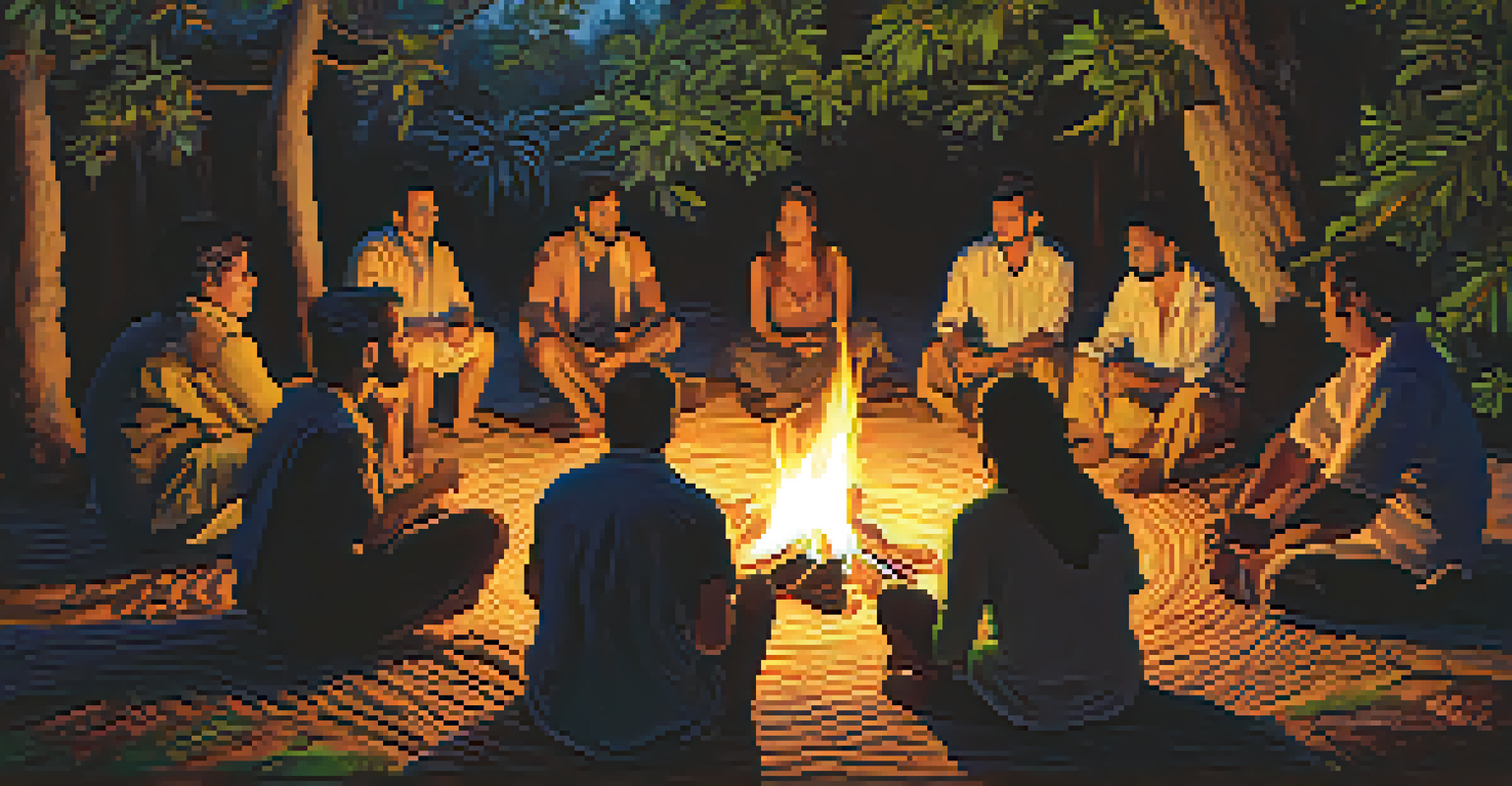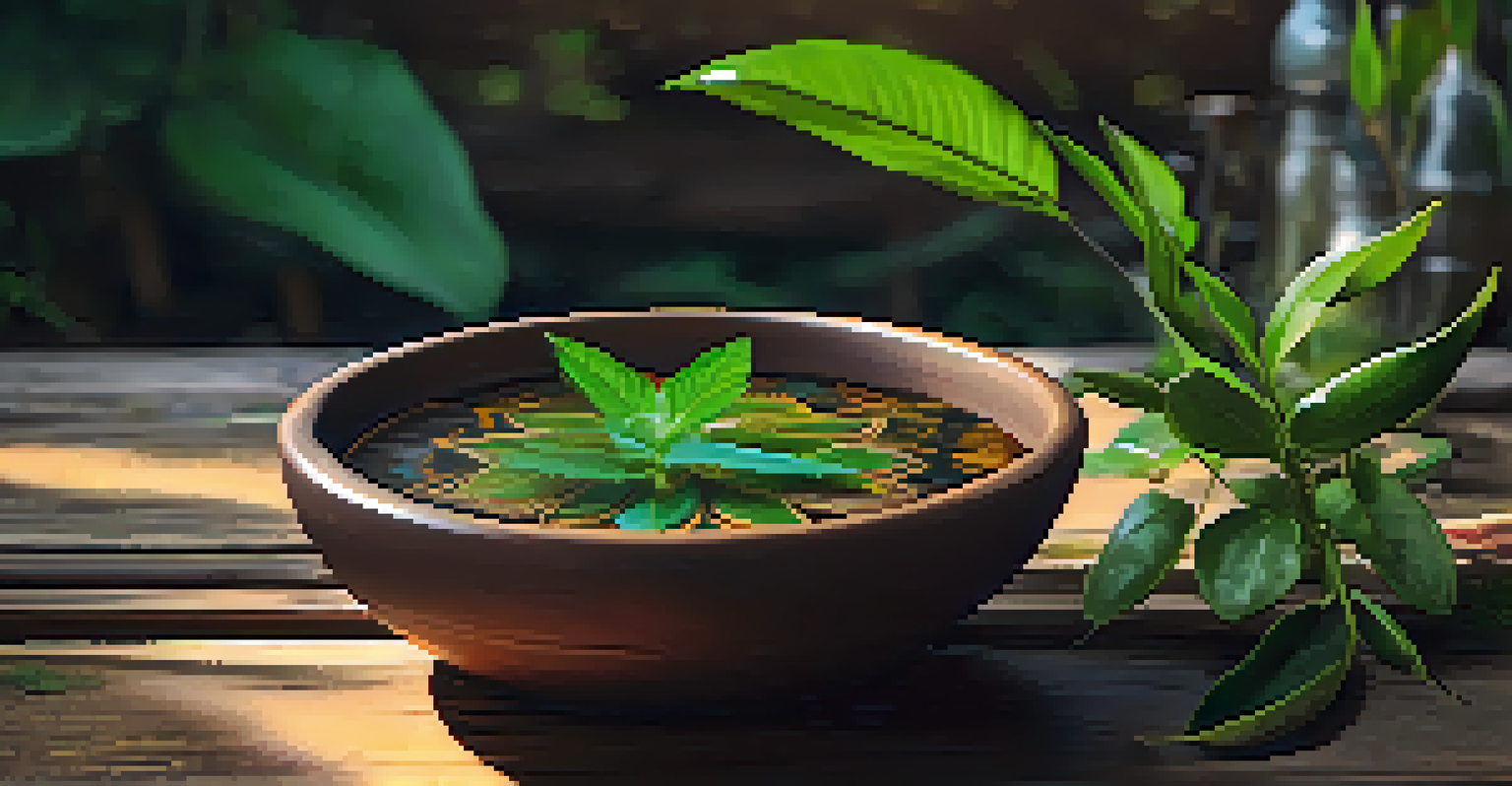Navigating the Fine Line of Ayahuasca Cultural Practices

Understanding Ayahuasca and Its Cultural Roots
Ayahuasca is a powerful brew traditionally used in Amazonian cultures for spiritual and healing purposes. It combines the Banisteriopsis caapi vine with other plants, often leading to profound experiences. For many Indigenous communities, these ceremonies are sacred and integral to their identity, providing a connection to their ancestry and the natural world. Understanding this context is crucial for anyone interested in participating in an Ayahuasca ceremony.
We are all connected to the earth and each other, and it is through our relationships that we heal.
The cultural roots of Ayahuasca are steeped in rituals that have been passed down through generations. These practices are not just about the substance itself but also involve community, music, and the guidance of experienced shamans. Engaging with Ayahuasca outside of its traditional context can risk commodifying these rich cultural practices, which can detract from their meaning and significance.
By appreciating the cultural heritage of Ayahuasca, participants can approach their experiences with deeper respect. This understanding encourages a more responsible and ethical engagement with the practice, fostering a bridge between cultures rather than a divide.
The Rise of Ayahuasca Tourism and Its Implications
In recent years, Ayahuasca tourism has surged, with people traveling to South America for ceremonies. This phenomenon raises questions about exploitation and the dilution of authentic practices. Many tourists seek a transformative experience, but the influx can overwhelm local communities and their traditions. The commercialization of Ayahuasca can lead to untrained facilitators conducting ceremonies, potentially compromising safety.

While Ayahuasca can offer profound insights, the motivations of those seeking it can vary widely. Some may approach it as a mere recreational activity, which can undermine the ceremony's spiritual significance. This shift in perception not only affects the experience but can also lead to a lack of respect for the cultural practices surrounding it.
Cultural Roots of Ayahuasca
Understanding the deep cultural significance of Ayahuasca is essential for respectful participation in its ceremonies.
It’s essential for both participants and facilitators to navigate this space mindfully. Building awareness around the implications of Ayahuasca tourism can help maintain the integrity of these traditions while allowing for meaningful cross-cultural exchanges.
Ethical Considerations for Participants
Before participating in an Ayahuasca ceremony, it’s important for individuals to reflect on their intentions. Are they seeking genuine healing, spiritual growth, or merely curiosity? Understanding one’s motivations can help ensure a respectful and meaningful experience. Participants should also research the facilitators, checking their backgrounds and adherence to traditional practices.
To respect the Indigenous traditions is to recognize the power of the plants and the wisdom of the ancestors.
Approaching Ayahuasca with humility and respect is crucial. Engaging with the ceremony as an honored guest rather than a tourist can foster a deeper connection to the experience. This mindset encourages openness to the teachings that may arise, allowing for a more authentic journey.
Additionally, participants should be aware of the potential risks involved. Ayahuasca can have strong psychological effects, and it's vital to prioritize mental health and well-being. Consulting with professionals before embarking on this journey can provide further guidance and support.
The Role of Shamans in Ayahuasca Ceremonies
Shamans play a pivotal role in Ayahuasca ceremonies, acting as guides and healers. They carry extensive knowledge of the plants and their effects, as well as the cultural significance of the rituals. This expertise is crucial for creating a safe and supportive environment for participants. A good shaman can help navigate the often intense emotional landscapes that arise during the experience.
The relationship between a shaman and participants is built on trust and respect. Shamans often use songs, known as icaros, to enhance the ceremony and invoke healing energies. These songs are not just entertainment; they are integral to the process, reflecting the deep spiritual connection the shaman has with the plants and the participants.
Ethics of Ayahuasca Tourism
The rise of Ayahuasca tourism presents challenges that can dilute traditional practices and exploit local communities.
Choosing a reputable shaman is essential for a meaningful experience. Participants should seek out recommendations and take the time to understand the shaman's background and approach, ensuring they align with the participants’ values and intentions.
Respecting Indigenous Knowledge and Practices
Respect for Indigenous knowledge is fundamental when engaging with Ayahuasca. These practices have developed over centuries, shaped by the unique cultural and spiritual landscapes of the Amazon. Acknowledging this heritage not only honors the origins of Ayahuasca but also supports the communities that have preserved these traditions. It’s crucial to approach these practices with reverence, recognizing that they are not just commodities.
Many Indigenous communities are increasingly vocal about the need for respect and compensation for their knowledge. As Ayahuasca gains popularity, it’s essential to engage in fair practices that support these communities. This can involve participating in ceremonies that directly benefit Indigenous peoples, ensuring that they receive recognition and support for their cultural contributions.
By respecting Indigenous knowledge, participants can foster a more equitable relationship. This not only enriches the experience but also contributes to the preservation of these vital cultural practices for future generations.
The Importance of Aftercare in Ayahuasca Experiences
Aftercare is a crucial yet often overlooked aspect of the Ayahuasca experience. The intense nature of the journey can leave participants with a range of emotions and insights that need processing. Having a solid support system in place post-ceremony can help individuals integrate their experiences into their daily lives. This can involve talking with fellow participants or seeking guidance from knowledgeable facilitators.
Integration is key to making the most of the insights gained during the ceremony. This can include journaling, meditation, or engaging in community support groups. Taking the time to reflect on the experience can help individuals derive meaning from their journey and apply it to their lives.
Importance of Aftercare
Aftercare is crucial for integrating the profound insights gained during Ayahuasca ceremonies into daily life.
Moreover, aftercare emphasizes the importance of mental health. Participants should be aware that Ayahuasca can bring unresolved issues to the surface, which may require professional support. Prioritizing aftercare can ensure a holistic approach to the Ayahuasca experience, promoting overall well-being.
Creating a Responsible and Respectful Ayahuasca Community
Building a responsible Ayahuasca community starts with education and awareness. Participants and facilitators alike must understand the cultural significance of Ayahuasca and the ethical considerations surrounding its use. Sharing knowledge helps foster respect and appreciation for these practices, creating a more harmonious environment for all involved.
Encouraging open dialogue within the community can also lead to more responsible practices. This includes discussing the challenges and ethical dilemmas that arise from Ayahuasca tourism and exploring ways to support Indigenous communities. By fostering a culture of respect and understanding, the community can work together to navigate these complexities.

Ultimately, creating a responsible Ayahuasca community involves nurturing mutual respect and collaboration. By engaging thoughtfully with each other and the traditions of Ayahuasca, participants can contribute to preserving its cultural integrity while enjoying its transformative potential.